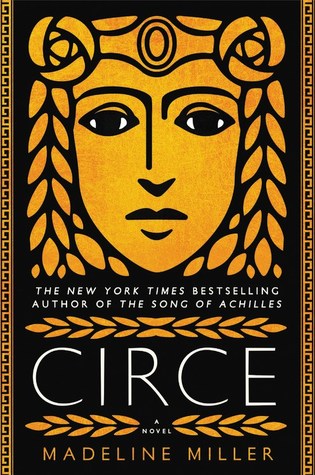Circe is a witch goddess from Greek mythology. Having read and enjoyed Madeline Miller's Song of Achilles some years ago, I was curious about this new book of hers.
Life is tough for Circe: born a daughter of the titan and sun god Helios, she is not quite as beautiful or striking as many other nymphs. Her ambitious mother is disappointed with her prophesied fate, so immediately starts having more children in the hope of making a "better one". Her siblings are mostly mean to her, and even the one she raises herself turns out to be incapable of love or loyalty. Circe is a bit of an ugly duckling in her family.
It's an encounter with Prometheus that starts her fascination with mortals. She idealises them to begin with, assuming a goodness in humans simply because they are not the selfish and cruel Gods she has grown up amongst. Her naive attempts to help a human don't bear the fruit she had hoped for (love), and her angry attempts at a small revenge turn deadly when she inadvertently creates a monster. Her attempts involve the discovery of witchcraft (magic from a different source than the gods').
Most of the novel takes place on the island Aiaia, where Circe is banished in punishment for her discovery of witchcraft. There, she lives with lions, wolves and wild boars, and, at times, a following of naughty nymphs who have displeased their families and are sent to serve her as punishment for their misdeeds. Sometimes, people and gods visit her...
Circe is a tougher subject matter than heroic Achilles or his lover Patroclus. Her powers and agency are limited: she has witchcraft, but is imprisoned. She is immortal, but female, in a time when women could only really wield power through men. Her role in myths is generally as a side quest, or an obstacle, in some other hero's tale: she is a cameo character. This makes her story more episodic, her relationships with other characters very short-term. She lives on a different timescale from mortals, so all the people she is interested in are mere phases in her life.
The book is faithful to the myths, and that faithfulness limits what it can do to breathe life into Circe's story. Perhaps the most frustrating element is that no gaps are filled in. For example, Circe is disgusted with gods and immortals, including her fellow nymphs. So when she finds her island populated with nymphs who are meant to serve her, she avoids them and isolates herself from them. Yet she is also vaguely protective of "her" nymphs when hostile forces arrive - though she does not seem to know any of them by name or speak with any of them, ever. Her fetish for mortals is understandable, and even her inherent distrust of immortals. A curmudgeonly attitude towards other nymphs who arrive on her island is no big surprise initially, but somehow, it would make a lot more sense for her to develop some kind of relationship with her fellow nymphs. After all, these are the ones who don't fit in, the ones banished for some reason, like herself. There is common ground here, and yet, that common ground is never explored. Circe is filled simultaneously with disdain, disinterest, and protectiveness for them, without ever making a friend or trying to do so.
I did enjoy reading about myths I knew very little about. However, I also found Circe a novel lacking something. It's episodic, but the episodes don't really create a coherent, continuous feeling. Circe's story is serious and a bit joyless. Somehow, a story about the first witch, who lived with and befriended lions and wolves on an island full of naughty nymphs and who turned men who annoyed her into pigs, should have had more of a spark and a twinkle in the eyes.
Rating: 3/5

No comments:
Post a Comment